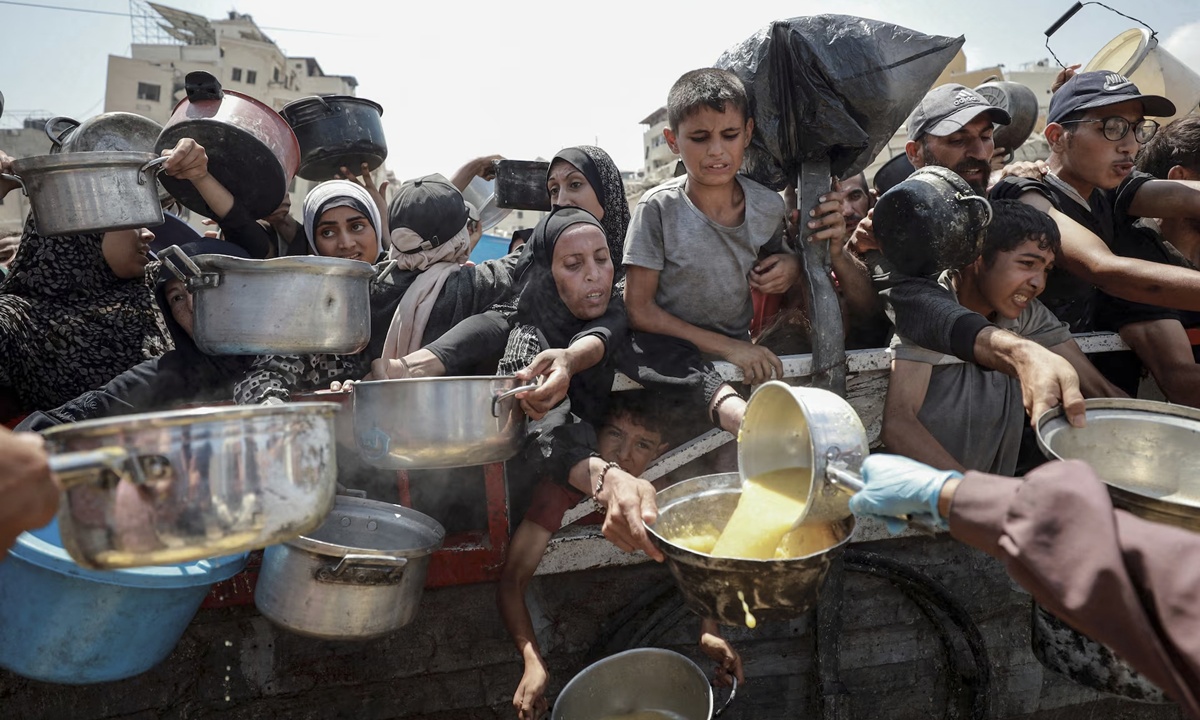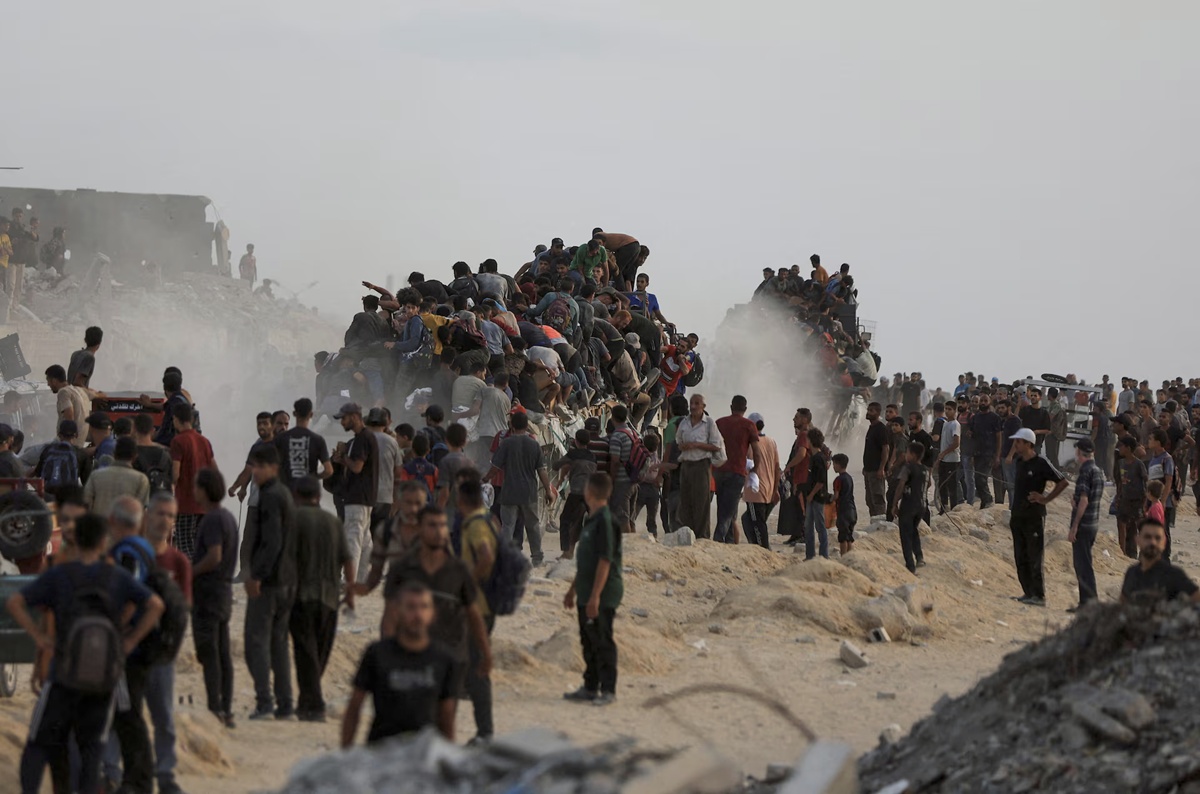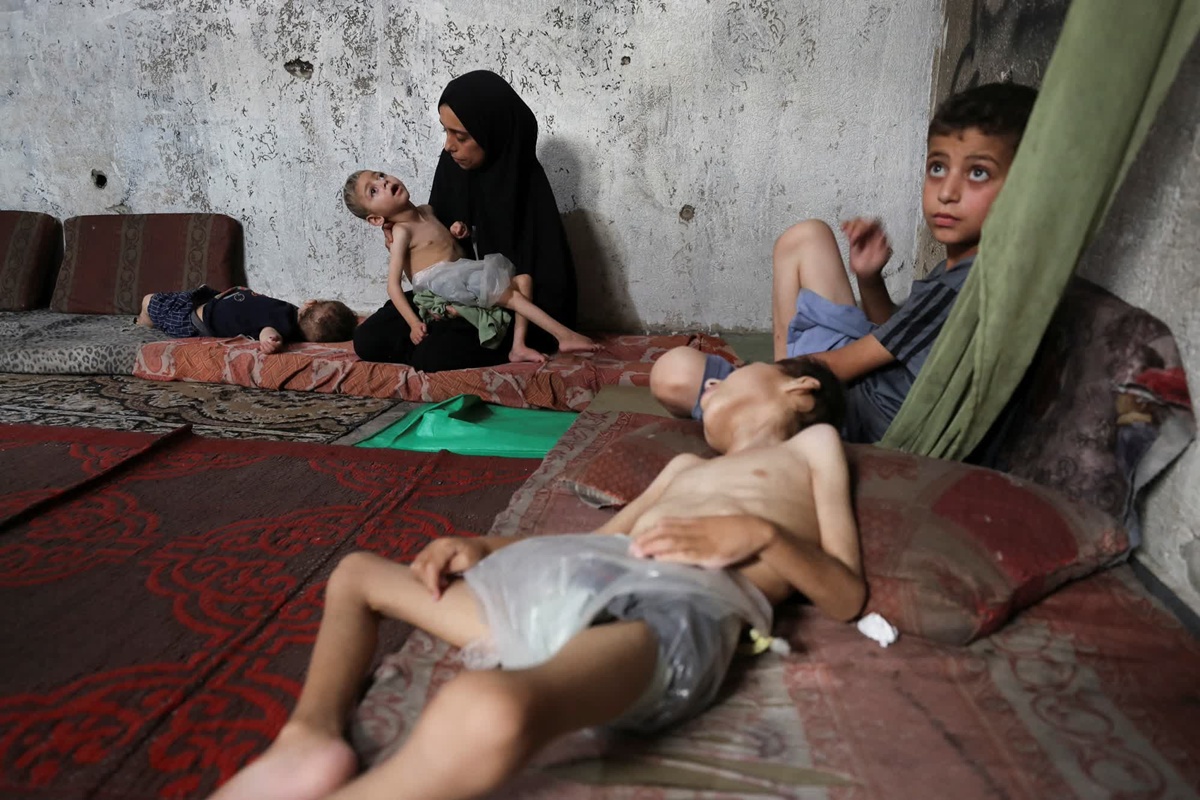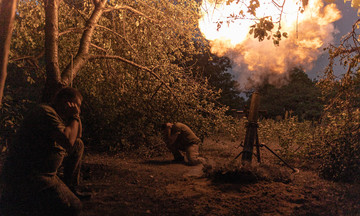The controversial Gaza Humanitarian Fund (GHF), a private aid provider backed by the US and Israel, took over aid distribution in Gaza in May after Tel Aviv eased its blockade.
Since then, over 1,300 Gazans have died trying to access the sole source of aid provided by the GHF, according to the United Nations. Civilians and UN aid workers in Gaza report that many were deliberately targeted by Israeli soldiers or GHF-hired security personnel while attempting to reach distribution points.
 |
People crowd to receive food from a charity kitchen amid the hunger crisis in Gaza City, 28/7. Photo: Reuters |
People crowd to receive food from a charity kitchen amid the hunger crisis in Gaza City, 28/7. Photo: Reuters
Despite the risks, thousands still venture to GHF distribution sites daily, driven by desperation. Witnesses describe soldiers firing into crowds scrambling for flour and milk.
One Palestinian woman described obtaining food from GHF distribution points as a "deadly journey," a gamble she takes to feed her children. She described the distribution points as violent, chaotic scrums where only the most daring receive anything.
"Children struggle to get aid, only to have men snatch it away," she said.
After risking her life and injuring her arm in the crush, she managed to obtain rice, oil, and a can of tomatoes. She considered this a "blessing from God."
A Gazan boy explained that the GHF distribution point was his only option. "I have to get food for my siblings. My father is dead. If I don't go, they'll starve. What else can I do?" he asked.
He witnessed hundreds of desperate people being shot at the distribution point.
Ibrahim Mekki, from the Nuseirat refugee camp in central Gaza, reported waiting at least six hours for a few bags of pasta.
"Shooting, death, destruction. All for what? A little food," he said. "It's a trap... They let you get a little closer, then they open fire."
"Look at me, what do I have? Nothing," he said, holding up two small bags of pasta and a bag of steamed wheat. "It's not enough to feed the children for a day. I have to come back and try my luck every day."
Rakan Jneid witnessed people rushing aid trucks near a GHF distribution point, some being run over.
"Today the aid trucks had milk, and people started fighting over it. The security personnel took advantage of the chaos and opened fire," Jneid said.
A mother of eight said her 5-month-old daughter is malnourished because she lacked sufficient food during pregnancy. She also lost a son to the same cause.
"He died of severe malnutrition. We had nothing to feed him. He died in my arms as I carried him to the hospital," she said.
Hani Abu Rizq, 31, walks Gaza City's ruined streets with two bricks tied to his stomach, the rope cutting into his loose clothing. He is desperately searching for food for his mother and seven siblings. The bricks are an ancient technique he never thought he'd use.
"We are starving," he whispered, exhausted. "Even the word 'starving' doesn't capture what we're going through."
Rizq tightened the rope around his waist. "I've resorted to the old ways, tying stones to my stomach to try and ease the hunger," he said.
Rizq used to enjoy food and gatherings. He recalled cozy dining rooms with home-cooked feasts and evenings filled with desserts and drinks.
 |
People climb on aid trucks entering Gaza on 29/7. Photo: Reuters |
People climb on aid trucks entering Gaza on 29/7. Photo: Reuters
"Now we buy sugar and salt by the gram," he said, gesturing towards empty stalls that once overflowed with produce. "A tomato or a cucumber is a luxury, a distant dream. Gaza has become more expensive than anywhere else in the world, and we have nothing."
During nearly 22 months of conflict, Gaza's food supply has drastically dwindled. The blockaded territory relies entirely on Israel, which has restricted access to everything from flour to cooking gas.
Since 2/3, humanitarian aid and essential supplies entering Gaza have plummeted. Israel completely blocked food shipments from March to May and has since allowed only minimal aid, drawing international condemnation.
Gaza's health authorities report at least 159 deaths, including 90 children and infants, from malnutrition and dehydration during the conflict.
The World Food Programme warns of widespread famine, while UNICEF reports that one in three children under five in northern Gaza suffers from acute malnutrition.
Fidaa Hassan, a former nurse and mother of three from the Jabalia refugee camp, recognizes the signs of malnutrition.
"I studied them," she said from her family's shelter in western Gaza. "I'm seeing them in my own children."
Her youngest, Hassan, two, wakes up crying for bread every morning, but there is none.
"Before the conflict, we celebrated each child's birthday with parties. But Hassan turned two a few months ago, and I couldn't even give him a proper meal," she said.
Her 10-year-old son, Firas, shows clear signs of severe malnutrition.
Before the war, her home was filled with laughter during meals. "We used to eat three to four meals a day," she recalled. "Lunch was family time. Winter evenings were filled with the aroma of lentil soup. We spent spring afternoons carefully preparing stuffed grape leaves."
"Now, we sleep hungry," she added. "No flour, no bread, nothing to fill our stomachs. We haven't had a piece of bread in two weeks. A kilogram of flour costs about 40 USD, and we can't afford it."
Hassan was six months old when the Israeli military launched its operation in Gaza. Now, at two, he appears listless.
The UN has repeatedly warned that Israel's blockade and aid restrictions are creating a famine in Gaza.
According to the UN Office for the Coordination of Humanitarian Affairs, only a fraction of the 600 trucks of food and essential supplies needed daily reach Gaza. The Integrated Food Security Phase Classification system has classified northern Gaza as Phase 5: Catastrophe/Famine.
Amid the insecurity, the little aid that enters Gaza is often looted, leaving those in need without access.
Hala Mohammed, 32, holds her three-year-old son, Qusai, in a relative's cramped shack in Remal, Gaza City. She can't bear to see him cry from hunger each morning.
"There's no flour, sugar, or milk," she said. "We bake lentils like flour and cook plain pasta to fill our stomachs. But the hunger persists."
 |
A mother holds her malnourished and cerebral palsy son at a school where her family is sheltering in Gaza City on 24/7. Photo: Reuters |
A mother holds her malnourished and cerebral palsy son at a school where her family is sheltering in Gaza City on 24/7. Photo: Reuters
Before evacuating due to the fighting, the Mohammed family never knew hunger. Past milestones were marked with feasts: New Year's, Mother's Day, birthdays for her husband, mother-in-law, and Qusai.
"So many of our memories revolve around family meals. Now, they're just memories," she said. "My son is hungry, and all I can do is hold him. The hunger spreads like cancer, slowly, silently, and relentlessly. Children are withering before our eyes, and we can't do anything."
Vu Hoang (According to Al Jazeera, AFP, Reuters)












